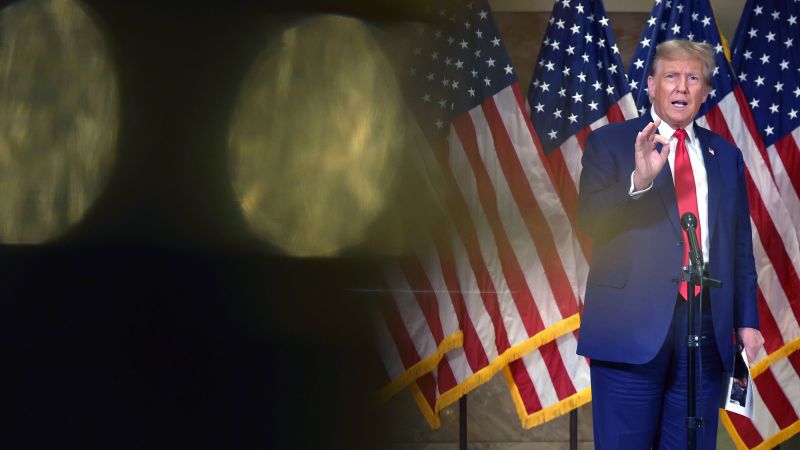Yeah it would be clearest if there was a single stance the Supreme Court can take. My layman non-American analysis sees it largely going one of 3 ways:
A - US Supreme Court adds no comment and lets the Colorado court decide: Each state’s supreme court has the final decision whether Trump is on the ballot where challenged.
B - US Supreme court overrides Colorado court and says Trump needs to be allowed on ballot no matter what because the Constitution doesn’t matter if Congress does nothing about it, self-executing-schmexecuting, except where it’s convenient for SCOTUS interests. Then, anyone challenging Trump’s eligibility as a candidate will need to challenge over a different rule. **
C - US Supreme court rules that Trump violated 14th amendment and is ineligible, so wherever Trump is challenged courts will have precedent to bar him.
** Funny sidenote from the Maine case, one of the challenges was that since Trump asserts he won in 2020, he cannot run for 3 terms per the 22nd Amendment. That challenge was denied because neither group made a case that Trump won in 2020.
The phrasing of the 14th is VERY specific:
“No person shall be a Senator or Representative in Congress, or elector of President and Vice-President, or hold any office, civil or military, under the United States, or under any State, who, having previously taken an oath, as a member of Congress, or as an officer of the United States, or as a member of any State legislature, or as an executive or judicial officer of any State, to support the Constitution of the United States, shall have engaged in insurrection or rebellion against the same, or given aid or comfort to the enemies thereof. But Congress may by a vote of two-thirds of each House, remove such disability.”
“or hold any office, civil or military, under the United States” - Would mean the President. It’s a civil office.
“or as an officer of the United States” - This, we would need the court for. He swore an oath, but is the Office of the President an officer of the United States? The other options here clearly do not apply.
“to support the Constitution of the United States” - This is the big one. The Presidential Oath of Office does not use the word “support”.
“shall have engaged in insurrection or rebellion against the same, or given aid or comfort to the enemies thereof.” - This is the piece we really NEED the court to rule on and the piece I think they will attempt to dodge the hardest.
Because there is a crimimal case pending, I really doubt they’ll say anything that will impact that case, one way or the other.
They may wait for that case to proceed and rule on all of it together.
Article 6 of the Constitution says, with my emphasis on a pertinent part:
The Senators and Representatives before mentioned, and the Members of the several State Legislatures, and all executive and judicial Officers, both of the United States and of the several States, shall be bound by Oath or Affirmation, to support this Constitution; but no religious Test shall ever be Required as a Qualification To any Office or public Trust under the United States.
Maybe I’m wrong here, but I’d think that the President is “an executive Officer of the United States” thus bound by the oath/affirmation they took, regardless of whether the oath said “support the Constitution” verbatim, to support the Constitution per this article…
He has already been found to be an insurrectionist in several courts now, that part is not up for debate, he is. If the Supreme Court rule that even if he is an insurrectionist it’s ok then they are saying the president is above the law, essentially the argument Trump’s lawyer was trying to make in his DC case. This would also mean we have just made Biden a dictator as he would no longer need to hold an election or step down. It would be King Biden until he hands the power over to someone else.
Found to be an insurrectionist, but not convicted of insurrection and that’s the rub, I don’t think the Supremes are going to be willing to put their thumb on the scale in a criminal case that hasn’t even gone to trial yet.
It doesn’t say you have to be convicted of insurrection, just engage in insurrection, or give aid or comfort to those that did. And a vote of 2/3 from Congress and the Senate would be required to over-ride that (which will never happen) to remove that disqualification.
The 14th was written in a simpler time, when it was easy to see who the Confederates were.
Trump is making the argument that he wasn’t overthrowing anything, that he was attempting to preserve his legitimate government.
Now you and I know that’s bullshit, but it’s not on the same level as, you know, signing articles of Confederacy and waging actual war.
In the end, Jack Smith and the 1/6 trial will decide it, but I don’t think the Supremes are going to decide it before it even gets started
It’s already been decided he did in several courts, it’s been determined to be a fact of law, he committed insurrection. The only piece of the puzzle is if the Supreme Court wants to weigh in on if it pertains to a President,or if they remain hands off and will just let every state decide their own interpretation of the amendment. Several states have already said he was allowed on the primary only because they didn’t feel like the 14th amendment applied to primary elections, but would 100% apply when it was time for federal election. So if left up to the states I think we would see even more of them do the correct thing here in order to comply with the constitution.
The office of president is also a military office. Potus is also the commander in chief. The military bit covers that too.
Civilian commander, the President is, by design, not a military position.
Makes sense… Oregon’s legal system is strained as it is without having to run appeals through the 9th circuit and Supremes.
For those blissfully unaware, =/>95% of the state of Oregon is MAGA breeding grounds. The state was literally founded by the mafia, KKK, bootleggers, pimps, et al (the furthest they could get from the seat of gov’t at the time, to avoid prosecution), and the only Blue havens are Portland, Eugene, and parts of Salem the capitol. Hell, even Corvallis (home to OSU) is strongly red outside of the student population. Please, don’t expect much from Oregon State-level government. 🥹
Square miles can’t vote. :) The population centers are all super blue. We don’t give two shits about the 3,000 Trumpers in Harney County.
I don’t disagree, but Presidential elections are rare by comparison to the rest of the BS the MAGAts get up to out here.
While this is technically true, it’s not the whole picture.
Oregon’s legislature is actually dominated by Democrats. The ratio is 17:13 in the state Senate, and 35:25 in the state House, both favoring Dems.
And that’s because Portland, Eugene, and the most progressive parts of Salem and Corvallis are where all the actual people live. Yes, once you’re out on the highways, you’re mostly in deep red territory, but it’s also much more sparsely populated.
This is the best summary I could come up with:
The ruling comes after Colorado and Maine kicked Trump off the ballot, after judges and officials determined that his role in the January 6 insurrection renders him ineligible for office.
They have said the “insurrection ban” was designed specifically to protect the country from someone like Trump – who, in their eyes, violated his oath of office when he tried overturn the 2020 election and incited the deadly Capitol riot.
Trump has claimed that the lawsuits are a thinly veiled attempt to abuse the legal system and distort the Constitution in a way that blocks him from the White House because he can’t be beaten at the polls.
The 14th Amendment, which was ratified after the Civil War, says US officials who take an oath to uphold the Constitution are disqualified from holding future office if they “engaged in insurrection” or have “given aid or comfort” to insurrectionists.
Free Speech For People, a liberal advocacy group, filed the lawsuit late last year directly at the Oregon Supreme Court.
Oregon Secretary of State LaVonne Griffin-Valade, a Democrat, previously asked the court to throw out the case on procedural grounds.
The original article contains 609 words, the summary contains 188 words. Saved 69%. I’m a bot and I’m open source!






